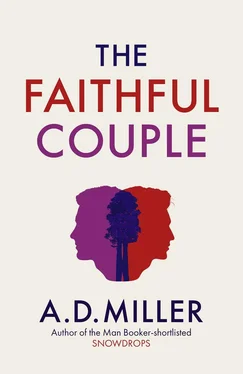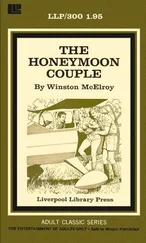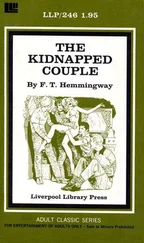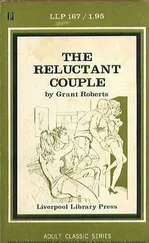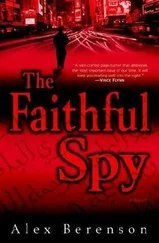Whatever happened now — he didn’t know what would happen now — Neil never again wanted to talk to Adam about California. These days he could scarcely picture her face. He would forget her name eventually: he would make sure that he forgot it. He hadn’t known her age, even if Adam had, that was a fact and not an extemporised excuse. To begin with, he found himself recalling on the Farringdon Road, she had seemed educated, knowing, ready. I’ll take care of it. But after they started, or he started, she became still. Still and taut rather than still and relaxed, breathing regularly in his ear as if she were concentrating, or being brave, enduring a minor operation without anaesthetic. Then a deep exhalation when he rolled off, when he should have cradled and kissed her but hadn’t.
He pulled over, outside a sushi restaurant, to let a wailing police car pass. Okay, he wasn’t proud of it. He certainly wouldn’t say that he was proud of it. Better that Adam had stopped it, or that he hadn’t started it at all. All the same, she consented; he apologised; it was an honest mistake. These days, in this godlessly promiscuous era, didn’t everyone over twenty have some version of this story in their past, some heat-of-the-moment coupling that might be regrettable and sordid, but was also finished and forgivable? In Harrow, when Neil was fifteen or sixteen, Dan let his friend Tezza hide in his wardrobe and watch while Dan had sex with his girlfriend. Tezza had dared him. In the kitchen, after she left, when they generously told him about their exploit, Neil was in awe: of the sex itself, obviously, but also of their gall and the macho priorities. The girlfriend never found out, so far as Neil remembered, though he couldn’t have said for certain.
It wasn’t only boys or teenagers who accumulated these stories. Once, when she was drunk, Jess had confided something she had done when she was drunker — in Faliraki, he thought she had said — while she was at university. Her friend, two men they met in a nightclub, a pedalo… Regret, not a characteristic emotion for Jess, was the reason she brought it up, rather than bravado or some bid to titillate or make him jealous. He hadn’t known what to say, hadn’t said anything, wasn’t sure, in the morning, that she remembered telling him, and they had never talked about it again.
What was the point in dwelling on stuff like this? No harm done. Almost certainly no harm done. It was funny how these incidents came back to you, though, even when they belonged to other people. The nightclub in Faliraki and that pedalo and her friend.
Adam could have stopped him easily. Quick word, Neil? Jailbait, mate. No, I’m serious. He did. Some sixty-second exchange along those lines.
Neil found a space in a resident’s parking bay; he flipped the car around to reverse in. He was too tight on the driver’s side and had to manoeuvre out and back again. Perhaps it wasn’t just his money that irked Adam but Jess, the flat, the whole package, so badly that he had resorted to this kamikaze raid on Neil’s happiness. That was what their conversation felt like, even if he could never articulate the suspicion. This was one of those things that you both know but you can’t say, not because you couldn’t prove it — you wouldn’t have to prove it — but because once you had said it, it couldn’t be unsaid.
He punched in the code and climbed the stairs. There was no particular reason why he shouldn’t tell Jess about Yosemite. He would tell her tonight: him, Adam, the girl and her father, all of it. She would probably laugh at his solemnity, call him ‘sweet’, pinch his cheek, tell him to say a dozen Hail Marys and collect her dry cleaning for a month in penance.
Jess was in bed. He switched on the television — real murder on one channel, imaginary murder on another. The flat was preternaturally tidy, in urgent need of desecration, but Neil didn’t feel entitled to disorder the shelves or skew the furniture. Almost a year after they moved in here he still felt like a guest. He performed his efficient evening ablutions (teeth, face scrub, glance at his hairline) and slid in beside her. He would tell her in the morning.
He didn’t tell her in the morning. She was in a hurry, so was he, it wasn’t the right time. She asked after Adam’s brats — did the silver spoon require surgical removal? — kissed him on the forehead and left. Something about a strategy meeting. He would tell her later. Soon.
He checked his phone as he was putting it into his jacket. Two overnight texts: one from Strahan, sent at six o’clock in the morning, which said Office, 8.15 ; the other, from Adam, sent at half-past three, said, Great to see you. I’m sorry . Neil envisioned his friend pacing around in the small hours, bearing his infant daughter and the memories she inflicted.
As much as the lies, it was a matter of roles. Adam’s was always to be immaculate, intangibly superior. Neil’s was to be a kind of scrappy insurgent, amusing and testing but deferring to his friend. They had both seemed to understand that arrangement without it ever being articulated. Adam had been the one to phone the driveaway firms in San Diego; only he could have made the first phone call after they flew home. Yet neither of them were quite the things they had been a decade before. Perhaps Adam had never been what Neil wanted him to be in the first place. The question was whether after they stripped away the made-up stuff, all the mutual invention, after he subtracted these lies, there was anything left, anything true and real, which was worth keeping.
Neil didn’t know what had happened that night ten years ago. Adam thought he knew, but he had only a distorted memory of a daze. He wanted to be able to forgive him. Halfway to the front door Neil took out the phone from his pocket and replied to Adam’s text.
Ruby is adorable
Neil wanted a drink, a proper drink, but he wasn’t sure if that was allowed. He hadn’t seen the menu — Azim had ordered for all of them, shashlik and sturgeon and a delicate Caucasian calzone — and he didn’t know whether alcohol was included. Finally, halfway through the meal, sweating into his suit and doubting that he could endure the internecine bonhomie without lubrication, Neil meekly asked whether beer was available.
Azim laughed, rocking his head back, mouth open, lips and moustache stretching thin. Elin flicked a finger, once, beckoning an assistant-cum-bodyguard and dispatching him into the courtyard for the drinks.
‘This isn’t Tora Bora,’ Azim said, still laughing.
Standing upright against the wall of the private room, their other flunky didn’t move or smile. The world, Neil reflected, was approximately divided into the proprietors of violence — big-shots with assets to protect, hoodlums with nothing to lose, like the muggers who had roughed up Jess at the entrance to their building — and the herds of harmless people in the middle, peering at the carnivores above and below.
‘You like the fish?’ Elin asked. He had a round, pockmarked, simpleton’s face, which seemed designed by nature to appear misleadingly ingenuous.
‘Lovely,’ Neil lied. They were avoiding business talk, though Neil suspected Azim and Elin were discussing dates and numbers in their private exchanges.
‘Super fresh,’ Azim said. ‘House speciality.’
A muezzin sang out through a loudspeaker, somewhere above the restaurant in the old city. A cat’s tail twitched under the empty chair between Azim’s and Neil’s. He saw Azim notice the tail and for a moment thought the cat might be in jeopardy. Azim pinched some white fish-flesh between his fingers, fed it to the stray and smiled. The cat caressed his legs.
Читать дальше
